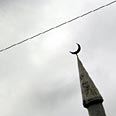
Test of Islamic unity
Swiss referendum results will bolster Muslim determination in Europe
Sunday’s vote to prevent building minarets on mosques in Switzerland signifies the larger debate regarding the formation of Islamic political identity in Europe. While the political Right in Switzerland can consider this a win for continuing Switzerland's historic secular identity, the long term effects are far from clear.
What is certain is that the Muslim communities in Switzerland - and the rest of Europe for that matter - will continue pursuing what they see as their democratic right to build mosques as they do throughout the rest of the world - with minarets. What was initially a Swiss referendum, has evolved into a genuine test of Islamic spirit and unity far beyond the borders of Switzerland returning the multi-faceted issue of Islam in Europe to the forefront of European debate.
Some pundits reduce the debate to the rise of the political Right in Europe to counteract the "Islamic threat" there but the reality is much more complex. The Muslim population is diverse: Most official estimates suggest close to 20 million Muslims in Europe the majority of whom holding European citizenship, originating from over 30 countries throughout the world and ranging from 1st to 5th generation European. After years of underdeveloped and fractured communities based on countries of origin a new trend is developing.
Muslims in Europe are coming to terms with their dual identity - Muslim and European - uniting to ensure their liberal democratic freedoms as citizens of Europe are protected. Therefore, the issue of Islam in Europe expands beyond migration and assimilation, and calls into question the core elements of European identity.
Despite initial and understandable frustration following the results of the referendum, the true test for the Muslim community in Switzerland and Europe is now. Now that the referendum is officially a law in Switzerland, Muslims in Europe are uniting and pursuing democratic methods as they seek to overturn the bill. In their attempt to block Islam’s call in Europe, the political Right has only increased the resolve of the Muslim community to exercise their democratic freedoms, enhancing the integration between Islamic and European identity.
Test of democratic strength
In essence, the referendum is a test of democratic strength of Muslims in Switzerland and Europe. In the immediate aftermath of Sunday’s referendum Muslims are proving their adoption of European democracy. No large scale riots, no burning of cars in the streets. Replacing previous spontaneous acts of releasing frustration is the quiet formation of lobbies and unified groups to appeal the law in European court and prevent its effects from spreading to the rest of Europe. Muslim communities throughout Europe and the world are taking note - learning lessons of this week’s referendum in order to be united and more efficient in defending their rights the next round.
The real debate is not about mosques, minarets, head scarves or even Islamic education. The real debate is to what extent Islamic principles, based on the Islamic sources of the Qur'an and Hadith, have already and will continue to integrate and influence European identity in the future.
As Muslims in Europe come to terms with their dual Islamic-European identity, they also understand that political unification will grant them greater political representation. Even more complex is how Europe should react to the integration of Islamic principles into European identity given the large and growing population of Muslim citizens who are seeking to increase their political rights. Have no doubt, Muslims in Europe are unifying their ranks to implement what they deem as their democratic right. Sunday's referendum in Switzerland will only bolster their determination.










